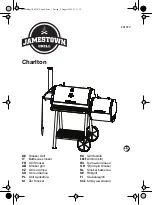
Figure 8b
Figure 8c
Figure 8d
Figure 8e
Figure 8f
8.6 Smoke Alarm Automatic Self-Test
The smoke chamber in the Smoke Alarms
automatically tests itself every 16 seconds.
If the chamber is degraded it will beep twice
every 48 seconds with 2 yellow LED flashes at
the same time. If this happens clean the unit.
If the beeping persists and the beep does not
coincide with a yellow light flash, return the
unit for service (see Section 5 - Getting Your
Alarm Serviced).
8.7 Dust and Insect Contamination
All Smoke Alarms and particularly the optical
(photoelectric) type are prone to dust and
insect ingress which can cause false alarms.
The latest design, materials and manufacturing
techniques have been used in the construction
of Resolution Products’ Alarms to minimise
the effects of contamination. However it
is impossible to completely eliminate the
effect of dust and insect contamination, and
therefore, to prolong the life of the Alarm you
must ensure that it is kept clean so that excess
dust does not build up. Any insects or cobwebs
in the vicinity of the Smoke Alarm should be
promptly removed.
In certain circumstances even with regular
cleaning, contamination can build up in the
smoke sensing chamber causing the Alarm
to sound. If this happens the Smoke Alarm
must be returned for servicing or replacement.
Contamination is beyond our control, it is
totally unpredictable and is considered normal
wear and tear. For this reason, contamination
is not covered by the guarantee and a charge
is made for all such servicing work.
8.8 End of life
The entire Alarm must be replaced if:-
• The unit is installed for over 10 years (check the
“replace by” date marked on the side of the unit).
Before the Alarm is safely discarded, remove
from the mounting plate & disconnect the
batteries.
Do not put the Alarm into a fire.
The Alarm should be disposed in a safe and
environmentally sound manner at your local
recycle centre. Contact your local authority for
further advise.
8. Troubleshooting
Alarms sound for no apparent reason
• Check for fumes, steam, etc. from the kitchen
or bathroom. Paint and other fumes can cause
nuisance alarms.
• Check for any sign of contamination such as
cobwebs or dust. Clean the Alarm as described
in Section 8 if necessary.
10






























